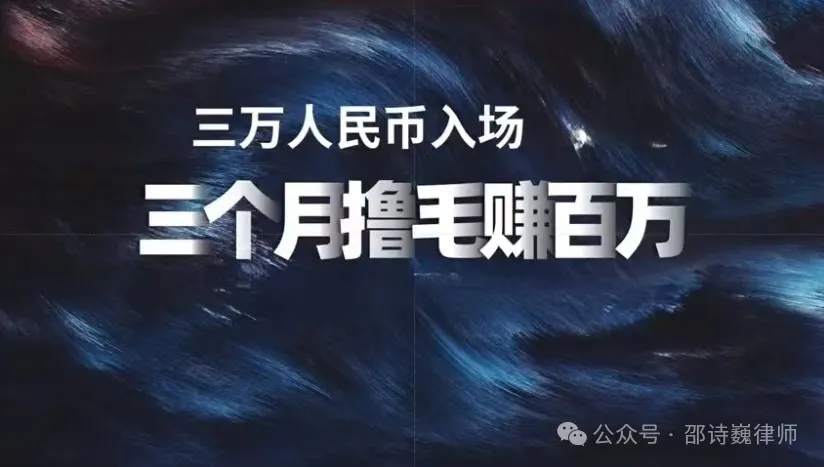
With the rapid development of blockchain technology and the growing prosperity of the cryptocurrency market, the Web3 field has seen the emergence of numerous innovative business models, among which the "Luma Studio" is a typical representative. These studios obtain profits for themselves and their clients through participating in promotional activities and airdrops organized by project parties.
Some friends planning to establish a "Luma Studio" often ask Lawyer Shao whether this can be done. After all, they often see various cases of overnight wealth accumulation through "luma" on the internet, which is certainly tempting. If this is feasible, they can invest some idle funds and start a side business with a few good friends, and share the profits in the future.
However, as newcomers to the cryptocurrency circle, USDT, and Web3 concepts, they are unsure about the legal risks of establishing a "Luma Studio" and where the boundaries of these risks lie.
So, during the operation of a "Luma Studio," what legal risks should be considered?
By Shao Shiwei, Lawyer
01. What is a "Luma Studio"?
"Luma" or "luma airdrop" refers to the early stage of Web3 project operation, where users qualify to receive airdrops by participating in project interactions. After the project goes live, the project party will reward users with tokens. After obtaining the tokens, users can cash out through over-the-counter trading or by selling them on exchanges.
At first glance, it seems that the project party is being "exploited" by users, but in reality, to qualify for the airdrop rewards, users need to meet the project party's airdrop criteria as much as possible. They need to help the project party test project vulnerabilities through various interaction methods, remain active, and then present the project party with user testing data to demonstrate the current project's active user base, trading volume, transaction frequency, TVL, etc., in order to obtain higher financing.
Originally, airdrop distribution was a user incentive measure adopted by the project party to reward early users. However, in China, a specialized studio has emerged that focuses on airdrop exploitation, using bulk-registered accounts and imitating user interactions to potentially receive future airdrops.
However, such behavior by "Luma Studios" may also trigger witch detection by the project party. If identified as a witch account (usually referring to a person or entity creating and manipulating multiple false identities or accounts for fraud or market manipulation, known as a witch attack), users may lose their airdrop eligibility.
02. What are the risks of "Luma Studios"?
1. Where are the boundaries of legal risks?
Can "Luma Studios" be established? Currently, this falls into a regulatory gray area in China. According to relevant policies in China, domestic ICO financing activities are explicitly prohibited, but airdrop exploitation falls under user behavior and can be likened to scenarios in games, where players, according to platform rules, expect to receive platform airdrop rewards by completing tasks. Additionally, the "points" obtained through user interactions are not tokens, and the project party does not make a definitive commitment to token distribution during the interaction phase, to a certain extent avoiding ICO regulation.
Although the Notice on Further Preventing and Disposing of Risks Associated with Virtual Currency Trading Speculation in 2021 (the following article) explicitly states the legal risks of virtual currency investment and trading activities, the content of the article is too broad and vague. Is "luma airdrop" equivalent to "virtual currency investment and trading activities"? If so, who should bear the civil or criminal legal responsibility for any related disputes? We cannot draw a definitive conclusion from this article alone.
Notice on Further Preventing and Disposing of Risks Associated with Virtual Currency Trading Speculation
Yinfa [2021] No. 237
(4) Participation in virtual currency investment and trading activities carries legal risks. Any legal person, unincorporated organization, or natural person investing in virtual currency and related derivatives, in violation of public order and good customs, renders the relevant civil legal acts invalid, and any resulting losses shall be borne by the parties themselves; if suspected of disrupting financial order and endangering financial security, relevant departments will handle it in accordance with the law.
Therefore, we cannot statically assess whether establishing a "Luma Studio" itself involves legal risks, but rather consider the entities with which the studio will interact in this matter—employees, clients, and project parties. During interactions with these entities, there may be some uncertain, dynamic business and legal risks.
2. Business Risks of "Luma Studios"
"Standing at the wind's edge, even a pig can fly." Is it a good time to establish a "Luma Studio" now? It may no longer be. According to an interview article, "Luma Studios" first emerged around 2020 to 2021[1]. Early participants may have already received substantial returns through airdrop participation, but as more people enter this field, competition intensifies, drawing attention from project parties, hackers, and others.
"Luma Studios" are not as simple as registering accounts in bulk, interacting, and waiting for profits. They entail significant time, energy, and financial costs. Studios need to find a large number of projects to select from and must act like genuine users, continuously monitoring projects and engaging according to different project requirements. Additionally, some projects require staking USDT, Ethereum, and other tokens in digital wallets. Furthermore, any on-chain interaction incurs gas fees. Finally, the project party has the ultimate discretion over token distribution, and the form and timing of distribution are not definitively determined at the beginning of the project. Therefore, it is common for project parties to change their stance, leaving "Luma Studios" in a precarious position.
If the following situations occur, months or even years of hard work may yield no profits:
- The project party stops airdrop distribution.
- Airdrop profits are lower than the gas fees invested.
- Accounts are flagged as witch accounts (for example, consistent on-chain interactions, mutual transfers between multiple wallet addresses, which may be deemed witch behavior by the project party).
- Wallets are hacked (for example, leakage of private keys, mnemonic phrases, implantation of Trojan programs, or accidental clicking of phishing links).
- Failure to meet the project party's minimum interaction requirements.
- …
3. Potential Dynamic Legal Risks of "Luma Studios"
From the above introduction, it is evident that "Luma Studios" entail a certain degree of policy risk and are not a guaranteed profitable business. The timing of token distribution by the project party and the final amount of tokens that the studio will receive are unknown. Therefore, there are potential "dynamic" legal risks in the process of "luma" for oneself or on behalf of others.
(1) If the studio hires individuals to "luma" on its behalf, the following risks may exist:
Employees abscond with the tokens, or they secretly implant Trojan programs in the software or accidentally click on phishing links, causing the hard-earned profits of the studio to disappear.
In such cases, can the studio file a report? This is somewhat delicate: Is the studio a victim? Are the profits earned from "luma" legally obtained through legitimate means? Are these earnings legally protected? Such cases are common in reality:

(2) Since airdrops require continuous attention to project developments and have a high operational threshold, some studios not only "luma" for themselves but also provide airdrop proxy services for users.
Since it involves a time cost, charging a service fee for proxy services is reasonable. However, if, for various reasons, no profits are obtained later, and client relationships are not maintained, leading to a large number of users reporting being defrauded, from the perspective of judicial authorities, does this constitute the absorption of user funds for virtual currency investment and trading activities? It's really hard to say.
For example, in January 2024, the Fengtai police in Beijing released a case titled "First Case! Fengtai Economic Investigation Bureau Cracks Down on Blockchain Game Fraud." According to industry insiders, the involved blockchain game was a legitimate Web3 game project, and the so-called "victims" were investors in the project. It is possible that due to some conflicts between the two parties, the investors reported being defrauded, leading to the project party being charged with contract fraud.
Furthermore, if user funds are misappropriated during the proxy airdrop process and are discovered by the users (the reasons for discovery could be various, such as employee leaks or user-initiated verification), the studio may face civil breach of contract liability at the least, and criminal liability at the most. Even if it was done by an employee, from the perspective of legal liability, the blame still falls on the employer.

In summary, operating a "Luma Studio" to earn profits internally entails all risks or losses, while proxy airdrop services involve potential external third-party losses. Therefore, in comparison, the legal risks involved in proxy airdrop services will be higher. If one must proceed, it is still recommended for the studio to sign a written proxy contract with the client. Although the contract may not completely avoid or exempt the studio's own risks, it can at least make clear agreements on the obligations of both parties and allow users to fully understand the potential risks, filtering out some irrational users and reducing the likelihood of future complaints.
4. Legal Risks of Virtual Currency Deposits and Withdrawals
This is not only a risk that "Luma Studios" may face, but also a risk that anyone involved in virtual currency deposits and withdrawals may face. For the token rewards distributed by the project party, they will eventually need to be cashed out.
If, unfortunately, illicit funds are received during the cash-out process, there is a possibility of the bank account being frozen at the least, and involvement in criminal risks such as aiding and abetting or concealing at the most. For more information on this point, you can refer to Lawyer Shao's previous articles. In any case, it is important to carefully find reliable trading partners and perform KYC during the deposit and withdrawal process.
03. Final Thoughts
Overall, Web3 "Luma Studios" are currently in a regulatory gray area, and studios need to manage their relationships with project parties, clients, and employees.
Just last month, Binance co-founder He Yi also expressed his attitude towards "Luma Studios" (see image below). Therefore, studios should be aware that as the market matures, early opportunities for huge profits may decrease, so there is a need for long-term and diversified business planning.

[1] Interview with "Luma Studios": Revealing the "Brushing" World of Web3 - Tencent News https://new.qq.com/rain/a/20240701A067R600
免责声明:本文章仅代表作者个人观点,不代表本平台的立场和观点。本文章仅供信息分享,不构成对任何人的任何投资建议。用户与作者之间的任何争议,与本平台无关。如网页中刊载的文章或图片涉及侵权,请提供相关的权利证明和身份证明发送邮件到support@aicoin.com,本平台相关工作人员将会进行核查。




